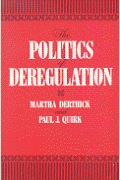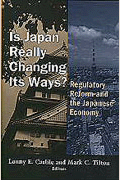This article was originally posted on Bloomberg Government on January 13, 2017.
On the campaign trail (and during his recent post-election thank you tour), President-elect Trump said: “We’re going to get rid of the regulations that are just destroying us.” With the announcement of a new head for the Office of Management and Budget, the Trump transition team is now staffing to make this happen. OMB oversees the day-to-day adding to and subtracting from the total body of federal rules. But this oversight will not be enough to reign in the inexorable growth of the regulatory state. To truly pare back the regulatory leviathan requires bringing the American people and Congress along. In short, the President should be playing a short and a long game.
The current strategy of the President-elect’s transition team is devoted to the short game. Step 1: Assemble a shopping list of regulations that is advanced by think tanks, industry associations and business (think Dodd-Frank for the financial sector and the Clean Power Plan for the electric utility sector); Step 2: Make political appointments who are sympathetic with the President-elect’s views on regulation; and Step 3: Figure out ways to repeal specific regulations or minimize a rule’s impact, such as through defunding enforcement.
There are three potential problems with this approach: First, it may not work. There is a very real possibility that there will be a public backlash, as happened in the Reagan era when it was tarnished by the scandal at the Environmental Protection Agency over the misuse of Superfund money. Second, many regulations are hard to remove. The recent power plant rule limiting carbon dioxide emissions could require a new rulemaking, which could take two years. Third, there is a tendency to want to rush things during the ten week transition from Election Day to the inauguration. In this short period, it is hard to identify regulations that are likely to do the most good for the public if repealed.
The short-term strategy needs to be augmented by a long game, lest the next President tries to undo what President-elect Trump will try to do. Here’s a three-part strategy for serving Mr. Trump’s near-term deregulatory agenda that could also promote long-term economic prosperity.
The short-term strategy needs to be augmented by a long game, lest the next President tries to undo what President-elect Trump will try to do.
- Assemble a bipartisan “Economic Prosperity Commission”, patterned after the base-closing commission. Mr. Trump could ask Congress to set up an Economic Prosperity Commission whose task would be to identify a number of regulations, or parts of regulations, whose repeal would contribute to long-term economic prosperity. Economic prosperity should be defined in benefit-cost terms, so the repeal of the regulation does more good than harm from the public’s point of view. Congress could set the number of regulations to be eliminated (say at least 10), and the areas from which regulations could be drawn (e.g., telecommunications, transport, labor, energy, banking, agriculture, environment, health or safety).
The Commission would be given one year to make recommendations. Congress would be given an up or down vote on the Commission’s proposed rules, but would not be allowed to revise the list in any way. The Commission should include well-respected academics and practitioners across the political spectrum — people like Chris DeMuth, Susan Dudley, John Graham, Sally Katzen, Bob Litan, and Cass Sunstein — who really know this terrain.
Mr. Trump should propose legislation that brings about lasting institutional change. One such change that I proposed with Bob Litan was that Congress create a Congressional Office of Regulatory Analysis (CORA), or a separate agency outside of the executive branch to independently assess important regulatory activity occurring at all federal regulatory agencies.
Requiring that a separate agency outside the executive branch assess important regulation makes sense for three reasons. First, because it is likely to serve as an independent check on the analysis done by regulatory agencies and the Office of Management and Budget. Second, it will help to make the regulatory process more transparent. Third, Congress can use the independent analysis to help improve regulation and the regulatory process.
CORA could help provide a more complete picture of the regulatory process, especially in areas that the executive branch has not examined carefully. For example, we only have a very incomplete understanding of the benefits and costs of regulatory activities at independent agencies, such as the Federal Communications Commission and the Federal Energy Regulatory Commission. Our understanding of the impacts of smaller regulations and regulatory guidance is also quite limited.
Mr. Trump needs to make the case to the American people, so that they can pressure Congress to do a better job. The case needs to be made in three ways. First, explain why business and the American people need less regulation in many areas to promote the well-being of the average American. Second, explain how the public could also benefit from smarter regulation. Citizens don’t, for example, need silly regulations that put milk spills on a par with oil spills because milk contains butter fat. But they do need well-thought-out regulations to protect our air and water. The president is ideally suited to make the case for what we do and do not need, and provide a rationale for the American people. Third, explain the need for developing a better understanding of the impacts of regulation on real people. People can understand the need for doing controlled trials with drugs to see whether a new drug actually works. The case needs to be made for collecting comparable evidence on the effectiveness of regulations. For example, do licensing regulations for becoming a barber simply raise the price of haircuts by restricting supply, or do they serve a broader public purpose? The President should make it clear to Congress that he will not sign any regulatory legislation that does not have funding for assessing the ongoing effectiveness of regulations.
The regulatory state was not built in a day. It will not be dismantled in a day, nor should it be. The best thing the President-elect could do is to develop a sensible long-game strategy that is focused on smarter regulation and paring back the excesses of the regulatory state.
The Brookings Institution is committed to quality, independence, and impact.
We are supported by a diverse array of funders. In line with our values and policies, each Brookings publication represents the sole views of its author(s).








Commentary
Op-edPlaying the long game on regulation
January 13, 2017